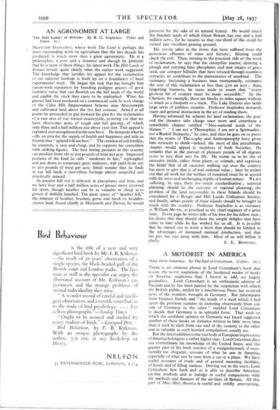AN AGRONOMIST AT LARGE
The Hill Lands of Britain. By R. G. Stapledon. (Faber and Faber. 6s.) PROFESSOR STAPLEDON, whose book The Land is perhaps the most outstanding work on agriculture that the last decade has produced, is much more than a great agronomist. He is a philosopher, a poet and a dreamer and though he pretends that he is none of these things, his latest work The Hill Lands of Britain reveals quite clearly what the earlier work suggested. The knowledge that justifies his appeal for the reclamation of our national heritage is built up on a foundation of hard experimental work. He began the task that has brought him nation-wide reputation by breeding pedigree grasses of great nutritive value that can flourish on the hill lands of the world and enable the stock they carry to be multiplied. When his grasses had been produced on a commercial scale he took charge of the Cahn Hill Improvement Scheme near Aberystwyth and cultivated land above the 700 feet contour. Armed at all points he proceeded to put forward his plea for the reclamation of a vast area of our wasted countryside, pointing out that we have iti,000,000 acres of rough and hill grazing, of which only three and a half millions rise above 1500 feet. This appeal is repeated and strengthened in the new book. He demands what he calls an area for the supply of health and happiness and tells us bluntly that" upland folk are best." The creation of soil fertility, he contends, is easy and cheap, and he supports his contention with striking figures. The best fatting pastures in this country can produce from a8o to 200 pounds of meat per acre. Improved pastures of the kind he calls "moderate to fair," reploughed and put down to temporary grass mixtures, will yield from zoo to 300 pounds of meat per acre. Small wonder that he finds in our hill lands a marvellous heritage almost unspoiled and practically unused.
At present hill soil is deficient in phosphates and lime, and we have four and a half million acres of grouse moor reserved for sport, though heather can be as valuable to sheep as to grouse if skilfully handled. The great spaces of" heather fell," the mixture of heather, bracken, gorse and birch on boulder- strewn land, found chiefly in Merioneth and Devon, he would
preserve for the sake of its natural beauty. He would attack the bracken lands of which Great Britain has one and a half million acres, for he assures us that one-third Of this could be
turned into excellent grazing ground. .
His survey takes in the rivers that have suffered from the poisonous effluents of mine and factory ; filtering could check the evil. Then, turning to the practical side of the work of reclamation, he says that the caterpillar tractor, drawing a plough and carrying lime phosphates and new strains of grass seed, can conquer hillsides that have refused through countless centuries to contribute to the maintenance of mankind. The visionary, becoming a business man momentarily, estimates the cost of this reclamation at less than kw an acre ; then, forgetting business, he turns aside to assert that "every glorious bit of country must be made accessible." In the Cheviots, for example, there are blocks 20 miles square without so much as a footpath or a track. The Lake District also holds large areas of pathless country. Professor Stapledon demands maps and general instruction in the art of reading them.
Having advanced his scheme for land reclamation, the poet and the dreamer take charge once more and contribute a remarkable chapter entitled "Non-material needs of the
Nation." I am not a Theosophist, I ant not a Spiritualist ; not a Rudolf Steinerite," he cries, and then he goes on to prove that the tenets of The3sophy and Anthroposophy have given him seriously to think—indeed, the most of this penultimate chapter would appeal to members of both Societies. He remarks that in the pursuit of pleasure people of all degrees come to lose their zest for life. He warns us to be shy of excessive yields, either from plants or animals, and expresses the belief that of all exercises walking out over the country has most to give that is of real national value ; later he points out that all work for the welfare of mankind must be in accord with the inner and unchanging depths of human nature. We are suffering, he says, from too much standardisation ; national planning should be the outcome of regional planning, the problem of the land recoverable to these Islands .should be considered by a Rough and Hill Lands Utilisation Society, and finally, urban people of these islands should be brought in touch with the country. Professor Stapledon is as visionary as William Morris, as practical as the chief engineer of a great liner. Every page he writes tells of his love for his fellow men ; his desire that they should share the simple delights that have come to him while he has worked for us all. It is possible that he started out to write a book that should be limited to the advantages of increased national production, and that his pen has run away with him. Most of us will follow it S. L. BENSUSAN.






































 Previous page
Previous page